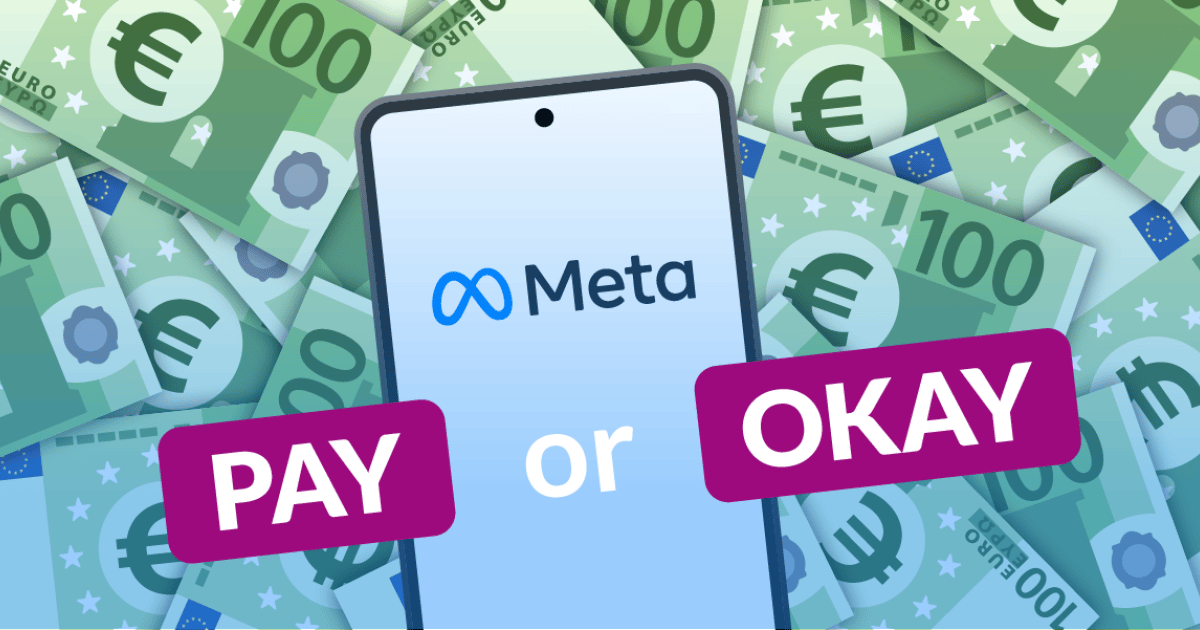noyb files GDPR complaint against Meta over “Pay or Okay”
Today, data privacy advocacy group noyb has lodged a complaint against Meta with the Austrian data protection authority. This comes after European users were presented with a stark “choice” – either agree to be tracked for personalized advertising or pay an annual fee of up to €251.88 to uphold their right to data protection on Instagram and Facebook.
This cost is not only unreasonable but goes against the fact that industry data indicates that only 3% of people desire to be tracked, while over 99% opt not to pay the “privacy fee”. If Meta is allowed to implement this, it could pave the way for similar practices by other companies. With the average smartphone containing 35 apps, maintaining privacy could potentially cost around €8,815 per year.
Another attempt to subvert EU privacy laws. Meta’s handling of user data for personalized ads was deemed illegal by the European Court of Justice (CJEU) in July. Moreover, the European Data Protection Board fined Meta €390 million in January for this breach, based on a previous noyb complaint from 2018. In a bid to circumvent these rulings, Meta is now introducing charges for users choosing a privacy-friendly setting, effectively undermining EU law. Since November, Instagram and Facebook users must decide between paying up to €251.88 annually or allowing their personal data to be surveilled for targeted advertising.
“Freely given” consent at a high price? According to EU law, consent to online tracking and personalized advertising is only valid if it is “freely given”. Meta’s implementation of a “privacy fee” contradicts this law. Facebook alone will impose a “privacy fee” of up to €12.99 per month if users do not consent to their personal data being used for targeted advertising. This means a total of €251.88 per year for a single individual using Instagram and Facebook. Comparatively, Meta’s average revenue per user in Europe between Q3 2022 and Q3 2023 was $16.79, translating to a mere €62.88 per user annually – making the monthly fee disproportionate.
Felix Mikolasch, a data protection lawyer at noyb, stated, “EU law requires that consent is the genuine free will of the user. Contrary to this law, Meta charges a “privacy fee” of up to €250 per year if anyone dares to exercise their fundamental right to data protection.”
3 to 10 percent want personalized ads – but 99.9 percent consent. Research indicates that “Pay or Okay” systems undermine free consent and influence users’ “free will”. The CEO of “Pay or Okay” provider contentpass revealed that 99.9% of visitors agree to tracking when presented with a €1.99 fee. Conversely, objective surveys show that only 3 to 10 percent of users want their personal data to be used for targeted advertising.
Max Schrems, Chairman of noyb, commented, “When 3 percent of people actually want to swim, but 99.9 percent end up in the water, every child knows that it wasn’t a “free” choice. It’s neither smart nor legal – it’s just pitiful how Meta continues to ignore EU law.”
Data protection could soon cost €35,000 per family. If Meta’s approach prevails, it could trigger a chain reaction. TikTok is reportedly exploring an ad-free subscription outside the US, and other app providers may follow suit, rendering online privacy unaffordable. The average person has 35 apps installed on their smartphone, meaning that following Meta’s lead could amount to an “fundamental rights fee” of €8,815.80 annually. For a family of four, the cost of data privacy could surpass €35,263.20 per year – exceeding the average full-time income in the EU.
Max Schrems added, “Fundamental rights are usually available to everyone. How many people would still exercise their right to vote if they had to pay € 250 to do so? There were times when fundamental rights were reserved for the rich. It seems Meta wants to take us back for more than a hundred years.”
Privacy only for the rich. This exorbitant cost fails to consider varying income levels in EU countries, with over 21.6% of the EU population at risk of poverty or social exclusion. For instance, the complainant in this case is financially distressed and receives unemployment assistance, making it impossible for them to afford an additional €250 per year when struggling to pay rent.
Max Schrems solemnly stated, “More than 20% of the EU population are already at risk of poverty. For the complainant in our case, as for many others, a ‘Pay or Okay’ system would mean paying the rent or having privacy.”
The DPA should initiate an urgency procedure. Given the severity of the violations and the extensive number of affected users, noyb urges the Austrian data protection authority to initiate an urgency procedure to halt the illegal processing. Additionally, noyb recommends that the authority imposes a deterrent fine to prevent other companies from replicating Meta’s approach.


